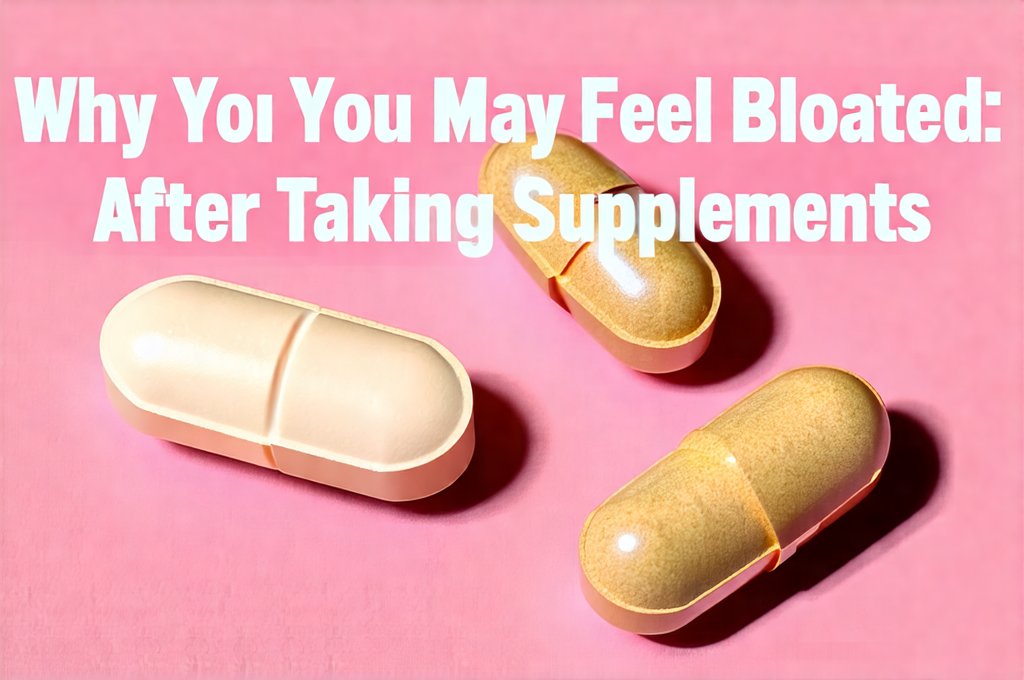The world of dietary supplements is vast and ever-growing, promising everything from enhanced energy levels to improved cognitive function. Many people integrate these supplements into their daily routines with hopes of bridging nutritional gaps or optimizing overall wellness. However, a surprisingly common side effect reported by supplement users is bloating – that uncomfortable feeling of fullness, tightness, and sometimes even visible abdominal distension. This isn’t necessarily a sign that the supplement itself is ‘bad’, but rather an indication that something about its interaction with your body needs investigation. Understanding why this happens is crucial for maximizing the benefits of supplementation without experiencing unwanted discomfort.
Bloating post-supplementation can be a multifaceted issue, stemming from ingredients within the supplements themselves, the way they’re formulated, individual sensitivities, or even how and when you take them. It’s important to remember that everyone reacts differently; what causes bloating in one person might have no effect on another. This article aims to unpack the common culprits behind supplement-related bloating, offering insights into potential causes, ways to mitigate discomfort, and when seeking professional guidance is advisable. We’ll explore both the direct impact of ingredients and indirect factors related to absorption and digestive processes, providing a comprehensive overview for anyone experiencing this frustrating side effect.
Common Culprits in Supplement Formulations
Many supplements contain ingredients known to potentially cause bloating in susceptible individuals. This isn’t always about toxicity or harmful substances; often, it relates to the natural properties of these compounds themselves. For instance, fiber-rich supplements, while incredibly beneficial for digestive health overall, can initially lead to increased gas production as your gut microbiome adjusts. Similarly, magnesium, a vital mineral involved in hundreds of bodily functions, draws water into the intestines, which can contribute to a feeling of fullness and bloating, particularly with higher doses.
Beyond these well-known examples, certain carbohydrates – like fructans found in some plant extracts or prebiotics intended to feed beneficial gut bacteria – are poorly absorbed by many people’s digestive systems. This leads to fermentation in the colon, resulting in gas production and bloating. Artificial sweeteners, fillers, and binders used in supplement manufacturing can also be problematic for sensitive individuals; these additives aren’t always readily digested and may disrupt the natural balance of gut flora. Even seemingly benign ingredients like calcium carbonate (used as a filler) can contribute to constipation and subsequent bloating in some.
Furthermore, the form of the supplement itself matters. Capsules, tablets, or powders all impact digestion differently. Powders mixed with liquid are often faster absorbed but may also lead to quicker fermentation if containing unabsorbed carbohydrates. Enteric-coated supplements are designed to bypass the stomach, potentially reducing nausea but sometimes causing bloating as they release their contents further down in the digestive tract. The key takeaway is that identifying the specific ingredient or formulation element triggering your bloating can be a process of elimination and careful observation. If you’re consistently experiencing discomfort after meals, it’s worth exploring whether can GERD make you feel short of breath is a contributing factor to your bloating.
Gut Health & Supplement Absorption
The health of your gut microbiome profoundly impacts how you respond to supplements, and consequently, whether or not you experience bloating. A robust and diverse gut microbiome efficiently digests food, absorbs nutrients, and regulates inflammation – all factors that influence supplement absorption and tolerance. If your gut is compromised by imbalances (dysbiosis), leaky gut syndrome, or chronic inflammation, it’s less equipped to process supplements effectively. This can lead to malabsorption, fermentation of undigested ingredients, and ultimately, bloating.
Supplements designed to support gut health – such as probiotics and prebiotics – ironically sometimes cause temporary bloating initially. This is often part of the rebalancing process as your microbiome shifts and adjusts. However, if the bloating persists or worsens after starting a probiotic, it might indicate that the specific strain isn’t well-tolerated by your system, or that you have an underlying gut issue requiring further investigation. Furthermore, conditions like Small Intestinal Bacterial Overgrowth (SIBO) can significantly exacerbate supplement-related bloating as bacteria in the small intestine ferment carbohydrates intended for larger intestinal digestion. Why some kids are always bloated after meals is also an important consideration, since gut health starts early in life.
Finally, the timing of supplementation relative to meals plays a role. Taking supplements on an empty stomach can sometimes lead to faster absorption but also increases the likelihood of digestive upset if your gut is sensitive. Conversely, taking them with food may slow down absorption but can also lessen the impact on your digestive system. The ideal approach varies from person to person and depends on both the supplement itself and your individual digestive capacity.
Identifying Your Personal Triggers
Pinpointing the exact cause of supplement-related bloating requires a systematic approach. Start by keeping a detailed supplement diary, recording everything you take, including dosage, brand, and time of day. Alongside this, maintain a food journal to track what you’re eating, as dietary factors can also contribute to bloating. Monitor your symptoms carefully – note when the bloating occurs, its severity, and any accompanying symptoms like gas, cramping, or changes in bowel movements.
- Consider eliminating one supplement at a time for a week or two to see if it makes a difference. This is known as an elimination diet.
- Pay attention to ingredients lists. Look for common triggers like fiber, magnesium, artificial sweeteners, fillers, and fructans.
- Observe how your body reacts to taking supplements with versus without food.
If you suspect a specific ingredient or supplement is the culprit, try switching brands or formulations. Some manufacturers use different fillers or binders that might be better tolerated by your system. If bloating persists despite these efforts, consider consulting with a healthcare professional – ideally one knowledgeable about gut health and nutrition. They may recommend further testing to identify underlying digestive issues like SIBO or food intolerances. Why you shouldn’t lie down after meals is also a good habit to develop, as it can exacerbate symptoms.
Managing Bloating & Improving Digestion
Beyond identifying triggers, several strategies can help manage supplement-related bloating and improve overall digestion. Staying adequately hydrated is crucial, as water helps move things through the digestive system. Regular physical activity also promotes gut motility and reduces constipation, which can contribute to bloating. Mindful eating practices – such as chewing your food thoroughly and avoiding large meals – can also ease digestion.
- Incorporate digestive enzymes into your routine, especially if you’re taking supplements that contain difficult-to-digest ingredients like fiber or proteins.
- Consider a low-FODMAP diet temporarily to identify potential sensitivities to fermentable carbohydrates. (This should be done under the guidance of a healthcare professional).
- Support your gut microbiome with a probiotic – but choose a strain specifically suited for your needs and monitor your response carefully.
Finally, don’t underestimate the importance of stress management. Chronic stress can negatively impact digestive function and exacerbate bloating. Practices like yoga, meditation, or deep breathing exercises can help reduce stress levels and promote gut health. Remember that addressing bloating is often about more than just eliminating supplements; it’s about optimizing your overall lifestyle to support a healthy and balanced digestive system. Signs you may need supplements can sometimes be hard to identify, but paying attention to these signals is important.
When To Seek Professional Help
While occasional bloating after taking supplements isn’t usually cause for alarm, certain situations warrant professional medical attention. If the bloating is severe, persistent, or accompanied by other concerning symptoms – such as abdominal pain, nausea, vomiting, diarrhea, weight loss, or blood in your stool – it’s essential to consult a doctor. These could be signs of a more serious underlying condition unrelated to supplements.
Furthermore, if you’ve tried eliminating potential triggers and adjusting your lifestyle without improvement, seeking professional guidance is advisable. A healthcare provider can help rule out other causes of bloating, diagnose any underlying digestive disorders, and recommend appropriate treatment options. They may also suggest specific tests – like a SIBO breath test or stool analysis – to identify imbalances in your gut microbiome. Never self-diagnose or attempt to treat serious health conditions without professional medical advice. Why some days you eat everything and feel nothing, while other times bloating is present, can be confusing – a doctor can help unravel these mysteries. And remember to consider if GERD makes you feel short of breath which may contribute to discomfort. Also, it’s important to know why GERD can make you feel like something is stuck. Finally, if you notice a reaction to alcohol on certain diets, it’s best to consult with your doctor. Remember that supplements are intended to supplement a healthy lifestyle, not replace it, and understanding the potential side effects is crucial for responsible supplementation.


















